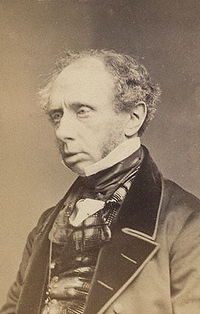Henry George Grey, 3rd Earl Grey
|
The Right Honourable The Earl Grey KG GCMG PC |
|
|---|---|
 |
|
| Secretary at War | |
|
In office 18 April 1835 – 27 September 1839 |
|
| Monarch |
William IV Victoria |
| Prime Minister | The Viscount Melbourne |
| Preceded by | John Charles Herries |
| Succeeded by | Thomas Babington Macaulay |
| Secretary of State for War and the Colonies | |
|
In office 6 July 1846 – 21 February 1852 |
|
| Monarch | Queen Victoria |
| Prime Minister | Lord John Russell |
| Preceded by | William Ewart Gladstone |
| Succeeded by | Sir John Pakington, Bt |
| Personal details | |
| Born | 28 December 1802 |
| Died | 9 October 1894 (aged 91) |
| Nationality | British |
| Political party | Liberal |
| Spouse(s) | Maria Copley (d. 1879) |
Henry George Grey, 3rd Earl Grey KG GCMG PC (28 December 1802 – 9 October 1894), known as Viscount Howick from 1807 until 1845, was an English statesman.
Grey was the eldest son of Prime Minister Charles Grey, 2nd Earl Grey, by his wife the Hon. Mary, daughter of William Ponsonby, 1st Baron Ponsonby.
He entered parliament in 1826, under the title of Viscount Howick, as Whig member for Winchelsea, and then briefly for Higham Ferrers before settling for a northern constituency. Northumberland in 1831 was followed by North Nortumberland after the Great Reform Act 1832. He remained in the parliaments dominated by his party and later by Lord Melborne as Prime Minister.
On the accession of the Whigs to power in 1830, when his father became prime minister, he was made Under-Secretary of State for War and the Colonies. This gave him responsibility for Britain's colonial possessions, and laid the foundation of his intimate acquaintance with colonial questions. He belonged at the time to the more advanced party of colonial reformers, sharing the views of Edward Gibbon Wakefield on questions of land and emigration, and resigned in 1834 from dissatisfaction that slave emancipation was made gradual instead of immediate. In 1835 he entered Lord Melbourne's cabinet as Secretary at War, and effected some valuable administrative reforms, especially by suppressing malpractices detrimental to the troops in India. After the partial reconstruction of the ministry in 1839 he again resigned, disapproving of the more advanced views of some of his colleagues.
...
Wikipedia
